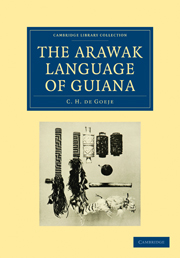Book contents
- Frontmatter
- Preface
- Contents
- List of literature
- Rules for pronunciation and abbreviations
- Alphabetical Index
- German words in Schultz' texts
- CHAPTER I Finite verb
- CHAPTER II Character of the Arawak words
- CHAPTER III Infinite verb
- CHAPTER IV Auxiliary verb a
- CHAPTER V Intensives, conjunctions, etc.
- CHAPTER VI K; B
- CHAPTER VII F; P; B
- CHAPTER VIII M
- CHAPTER IX N
- CHAPTER X D
- CHAPTER XI T
- CHAPTER XII Formation of verbs, etc.
- CHAPTER XIII L; R
- CHAPTER XIV H
- CHAPTER XV S
- CHAPTER XVI Vowels, diphotongs; colours
- CHAPTER XVII Classes of utterances; numerals
- CHAPTER XVIII Man
- CHAPTER XIX Foreign words. Arawak and Arawak-Maipure
- CHAPTER XX Origins of the Arawak language
- APPENDIX: Information collected in Surinam in 1907 and in 1928
CHAPTER III - Infinite verb
Published online by Cambridge University Press: 05 October 2010
- Frontmatter
- Preface
- Contents
- List of literature
- Rules for pronunciation and abbreviations
- Alphabetical Index
- German words in Schultz' texts
- CHAPTER I Finite verb
- CHAPTER II Character of the Arawak words
- CHAPTER III Infinite verb
- CHAPTER IV Auxiliary verb a
- CHAPTER V Intensives, conjunctions, etc.
- CHAPTER VI K; B
- CHAPTER VII F; P; B
- CHAPTER VIII M
- CHAPTER IX N
- CHAPTER X D
- CHAPTER XI T
- CHAPTER XII Formation of verbs, etc.
- CHAPTER XIII L; R
- CHAPTER XIV H
- CHAPTER XV S
- CHAPTER XVI Vowels, diphotongs; colours
- CHAPTER XVII Classes of utterances; numerals
- CHAPTER XVIII Man
- CHAPTER XIX Foreign words. Arawak and Arawak-Maipure
- CHAPTER XX Origins of the Arawak language
- APPENDIX: Information collected in Surinam in 1907 and in 1928
Summary
-Ci (-tu) can be suffixed to: 1) object-words and proper names, 2) words denoting position, direction or time, 3) quality-words, 4) action-words; it adds to the meaning of these words the principle of “being active”, “asserting oneself”. Presumably the t (which with B. often turns into c before the i) has here again the meaning of motion towards an object (with a touch of will-power in it).
These forms (eventually with an end-point pronoun or a form fulfilling a similar function, behind them) are sometimes used as substantives, and often as adjectives. In the latter case they may be placed either before or after the word governed, and this forms a transition to such uses as remind one of participles and gerunds. They may moreover take the particles fa, goba, etc. as suffixes.
a) Examples.
1) ark isikwa-ci-n (-n, possessive, § 81) l-onnakida kiana Noah, and Noah removed the covering of the ark, Pharisee lihi, Gamaliel ci iri, a-mairikota-ci misi-tu-ahaka-hu, a Pharisee (was he), named Gamaliel, a doctor of the law, aba-ro hiaro, Martha tu iri, a certain woman named Martha, kia hiaro Greek goba, Syrophenicia tu akirikia, the woman was a Greek, a Syrophenician by nation, ikihi-tu kaspara, a flaming sword, siba-tu taraffa, the (stone) stairs, siparari-tu t-isifo-do, the iron gate, to-tokoro-tu kwawma, garlands, yurua-tu ada, a bramble bush;
2) abar-li l-Isa, Awa o-loa o-loko-ci, the only begotten Son, which is in the bosom of the Father, bo-loko-tu kalime, the light which is in thee, yaha-ci ikirikia bihero-ci wakaia-ci o-koboroko, in this adulterous and sinful generation (Mk. VIII 38), taha-tu ororo, a far country;
- Type
- Chapter
- Information
- The Arawak Language of Guiana , pp. 70 - 79Publisher: Cambridge University PressPrint publication year: 2009First published in: 1928



